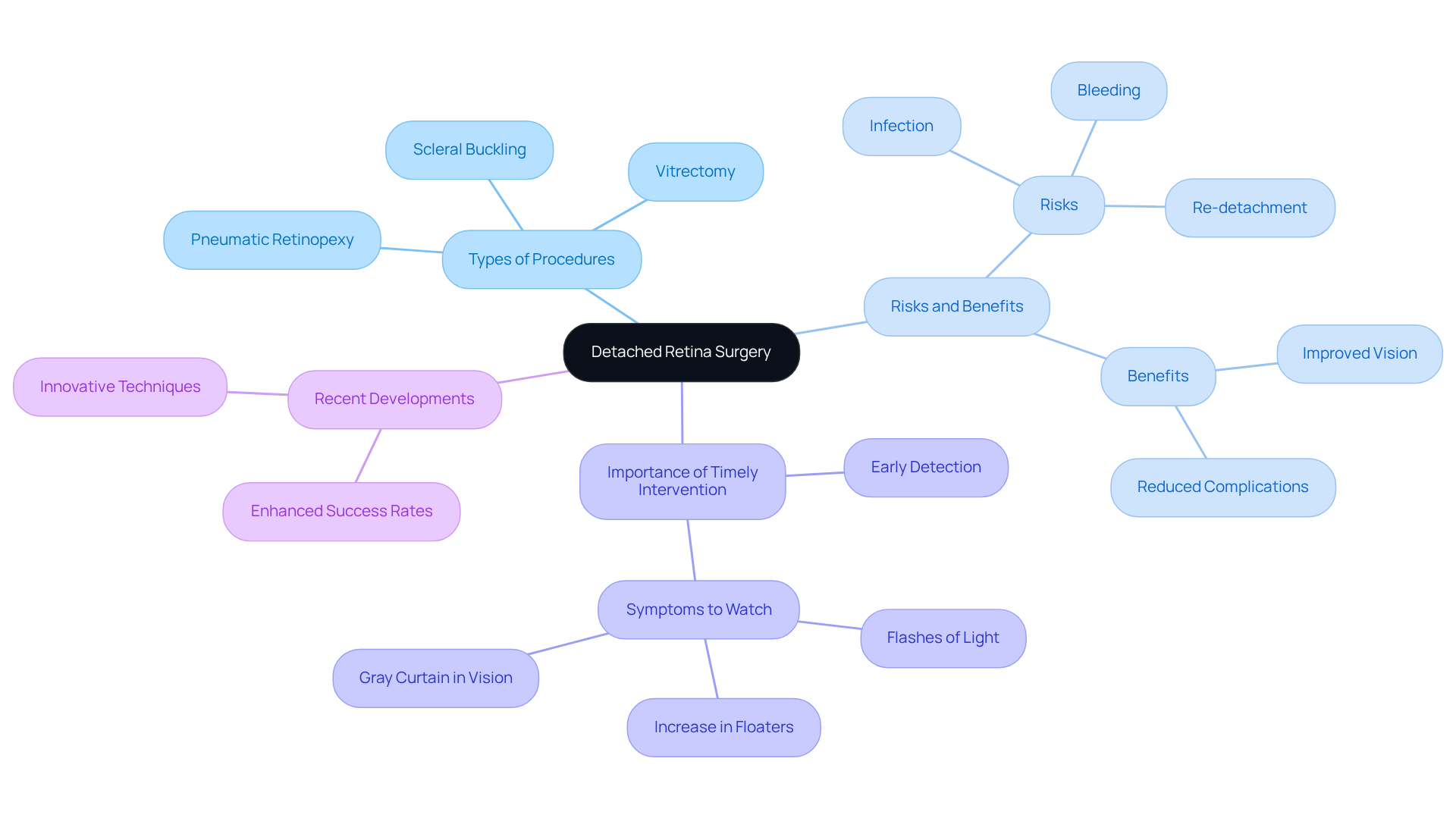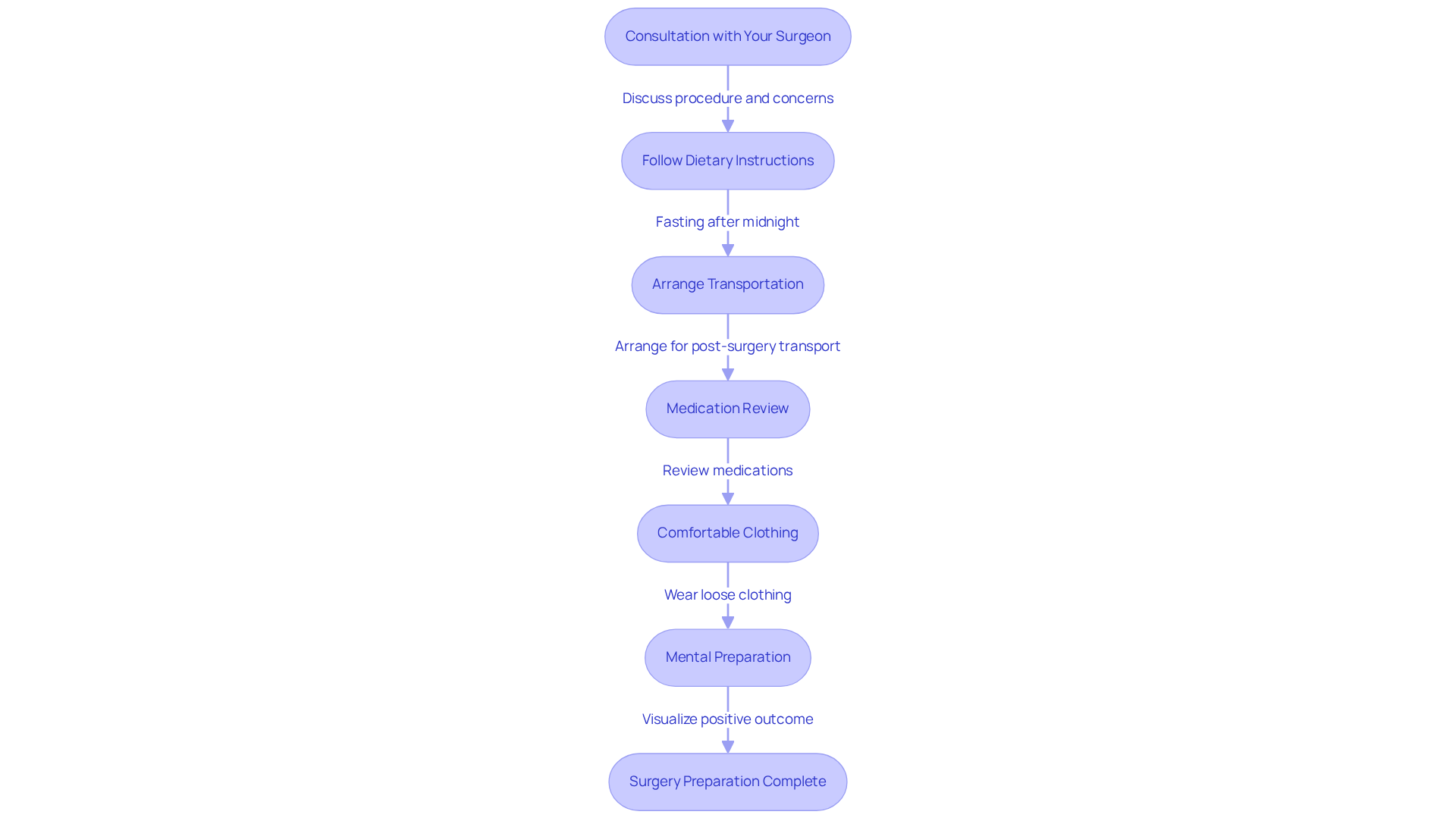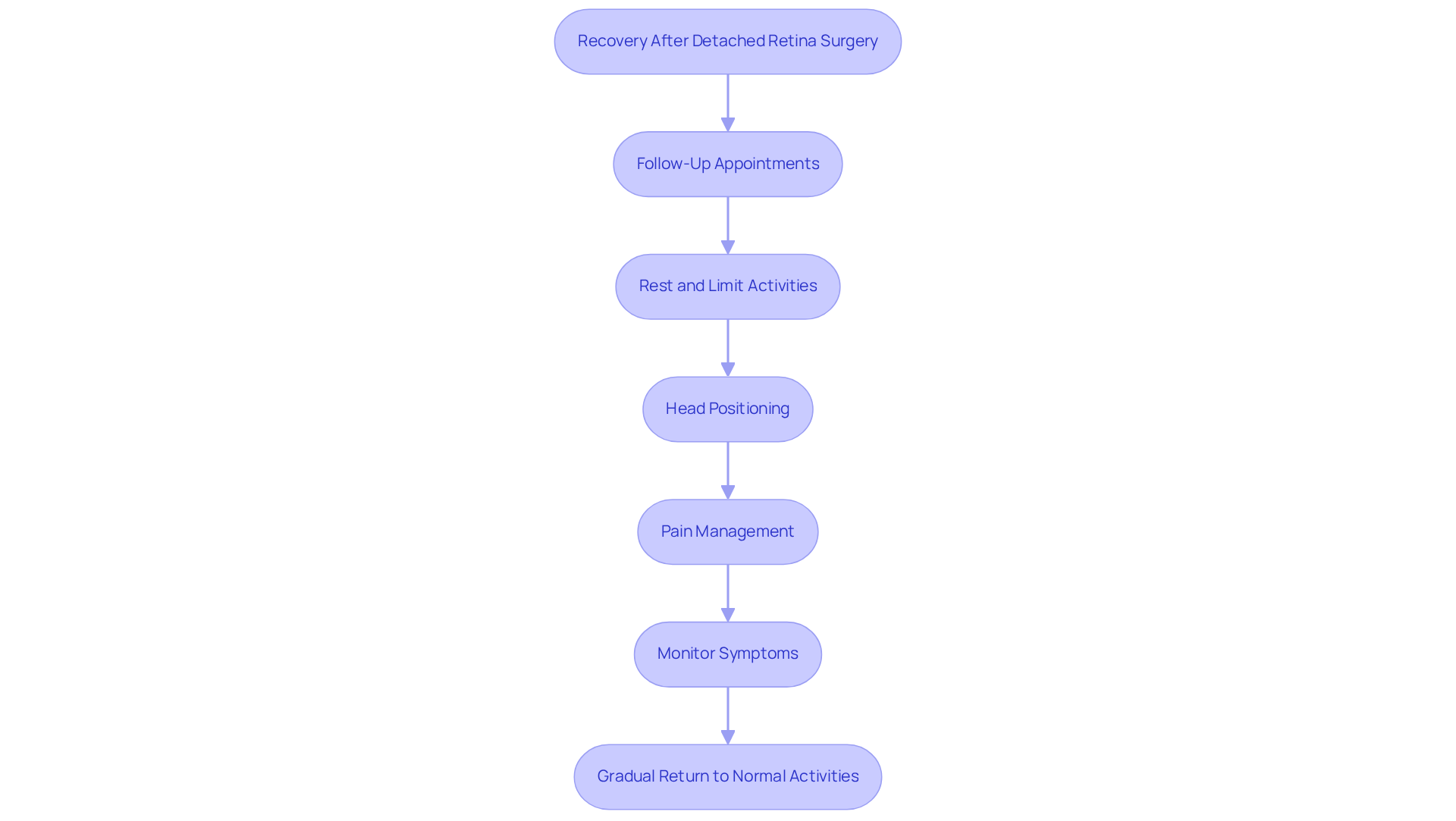Posted by: Northwest Eye in General on September 29, 2025
Overview
This article offers guidance on how to prepare for and recover from detached retina surgery, with a focus on your needs and concerns. We understand that facing surgery can be daunting, and we want to assure you that there are steps you can take to enhance your experience.
Pre-operative consultations are crucial, as they allow you to discuss your fears and expectations with your healthcare team. Adhering to dietary and transportation instructions is also important, ensuring you are well-prepared for the procedure ahead.
Post-operative care strategies play a significant role in your recovery. We encourage you to follow these guidelines closely, as they are designed to promote optimal healing and improve surgical outcomes. Remember, you are not alone in this journey; we are here to help you through the process.
Introduction
Understanding the intricacies of detached retina surgery is crucial for anyone facing this daunting procedure. We understand that the thought of surgery can be overwhelming, but it is a vital intervention to restore vision. This surgery involves various techniques tailored to your specific needs, yet it’s common to feel apprehensive about what lies ahead. This guide offers essential insights into preparing for surgery and managing recovery, empowering you with the knowledge to navigate your eye care journey confidently.
How can you ensure you are fully prepared and supported throughout this critical process? We are here to help you through this process.
Understand Detached Retina Surgery
The procedure known as is essential for reattaching the retina, which is a delicate layer of tissue at the back of the eye that may become detached due to factors like trauma, aging, or existing eye conditions. We understand that this can be a concerning experience. The medical approach for detached retina surgery may involve techniques like scleral buckling, vitrectomy, or pneumatic retinopexy, tailored to the specific type and severity of the detachment. Comprehending the intricacies of these procedures, along with their associated risks and benefits, is essential for individuals aiming to make informed decisions regarding their eye health.
Prompt intervention is crucial; research shows that timely medical treatment can greatly improve the chances of restoring vision and reducing additional complications. For instance, individuals who undergo pneumatic retinopexy, a less invasive option, often experience quicker recovery times and fewer risks compared to more extensive surgeries like vitrectomy. However, it’s common to feel apprehensive about medical procedures, as all carry inherent risks, including potential infection, bleeding, and the possibility of re-detachment.
Recent developments in medical procedures have enhanced success rates for detached retina surgery, with numerous individuals reporting favorable results after the operation. Ophthalmologists emphasize the importance of early detection and intervention, noting that recognizing symptoms such as sudden flashes of light or an increase in floaters can lead to timely treatment and better visual prognosis. Overall, comprehending the medical procedure and its implications enables individuals to actively participate in their eye care journey. Remember, we are here to help you through this process, ensuring that you feel supported every step of the way.

Prepare for Your Surgery
Preparing for detached retina surgery involves several essential steps that can significantly impact your surgical experience and outcomes:
- Consultation with Your Surgeon: We understand that this can be a daunting time. Schedule a pre-operative appointment to discuss the detached retina surgery procedure in detail. Studies show that patients who have a formal preoperative consultation on a different date from their procedure tend to achieve better overall results. This is your opportunity to ask questions and about detached retina surgery, ensuring you feel informed and confident.
- Follow Dietary Instructions: It’s important to adhere to dietary guidelines, typically fasting after midnight prior to the procedure. This is crucial for your safety during anesthesia.
- Arrange Transportation: Since anesthesia will impair your ability to drive, it’s vital to have someone available to take you home after the procedure.
- Medication Review: Inform your surgeon about all medications you are currently taking, particularly blood thinners. Adjustments may be necessary to minimize operation risks.
- Comfortable Clothing: On the day of surgery, wear loose and comfortable clothing to facilitate ease during the procedure and recovery.
- Mental Preparation: Familiarize yourself with the detached retina surgery procedure and visualize a positive outcome. This mental preparation can help alleviate anxiety and promote a smoother procedure experience.
Patient education plays a crucial role in improving operation results. As noted by C.J. Le Coz, improved education can lead to decreased cancellations, improved workflow, and reduced operating room delays. Testimonials from former patients often emphasize how understanding the process and maintaining open dialogue with their surgeons enhanced their confidence and satisfaction with the care provided. As one surgeon emphasized, meticulous attention to preoperative evaluations is essential, as it fosters trust and rapport between you and your physician, ultimately leading to improved surgical experiences. Furthermore, each patient encounter should be individualized, ensuring that preparation is tailored to meet your specific needs.

Manage Your Recovery After Surgery
Managing your recovery after your detached retina surgery is crucial for optimal healing, and we understand that this can be a challenging time for you. Here are some important steps to help guide you through the process:
- Follow-Up Appointments: Please make sure to attend all scheduled follow-ups with your surgeon. These appointments are vital for and addressing any concerns. They allow for an assessment of your progress and any necessary adjustments to your care plan.
- Rest and Limit Activities: It’s essential to allow your body to heal by resting and avoiding strenuous activities for at least two weeks post-surgery. This period is important for minimizing strain on your eyes and encouraging effective healing.
- Head Positioning: Depending on the type of surgery performed, you may need to maintain a specific head position, such as face-down. Adhering to these positioning guidelines is critical for the success of detached retina surgery.
- Pain Management: Use prescribed pain medications as directed, and don’t hesitate to report any severe discomfort to your doctor. Managing pain effectively can greatly improve your overall healing experience.
- Monitor Symptoms: Be vigilant for any signs of complications, such as increased redness, swelling, or changes in vision. It’s common to feel concerned, but promptly contacting your healthcare provider if these occur can help prevent further issues.
- Gradual Return to Normal Activities: After a few weeks, you can slowly reintroduce normal activities. However, please consult your surgeon for personalized advice based on your healing progress. This approach ensures that you do not rush back into activities that could jeopardize your recovery.
In the words of experts, “The earlier retinal detachment is detected and treated, the more favorable the results may be,” which highlights the importance of diligent follow-up care. Patient experiences reveal that adhering to these recovery protocols significantly enhances the chances of successful healing and restoration of vision following detached retina surgery. Remember, we are here to help you through this process.

Conclusion
Understanding the intricacies of detached retina surgery is vital for anyone facing this procedure. We understand that this can be a daunting experience, and this guide highlights the importance of timely intervention, effective preparation, and diligent recovery to optimize outcomes and restore vision. By grasping the various surgical techniques and their implications, you can make informed decisions about your eye health and feel empowered throughout your surgical journey.
Key insights discussed throughout the article emphasize the significance of:
- Preoperative consultations
- Adherence to dietary and medication guidelines
- The need for proper post-surgery care
Following specific recovery protocols—such as attending follow-up appointments, managing pain, and monitoring symptoms—can greatly enhance the healing process and contribute to successful results. Remember, early detection and intervention are critical, allowing you to engage actively in your recovery.
Ultimately, navigating through detached retina surgery is not just about the procedure itself but also about the proactive steps taken before and after. By prioritizing education, communicating with your healthcare providers, and adhering to recovery guidelines, you can significantly improve your chances of a favorable outcome. Taking these steps fosters confidence and reinforces the importance of eye health, encouraging you to seek timely treatment and support when faced with retinal issues.
Frequently Asked Questions
What is detached retina surgery?
Detached retina surgery is a medical procedure aimed at reattaching the retina, a delicate layer of tissue at the back of the eye, which may become detached due to factors such as trauma, aging, or existing eye conditions.
What techniques are used in detached retina surgery?
Techniques for detached retina surgery may include scleral buckling, vitrectomy, or pneumatic retinopexy, which are tailored to the specific type and severity of the detachment.
Why is prompt intervention important for detached retina?
Prompt intervention is crucial because timely medical treatment can significantly improve the chances of restoring vision and reducing additional complications.
What are the benefits of pneumatic retinopexy compared to other surgical options?
Pneumatic retinopexy is a less invasive option that often leads to quicker recovery times and fewer risks compared to more extensive surgeries like vitrectomy.
What risks are associated with detached retina surgery?
Risks associated with detached retina surgery include potential infection, bleeding, and the possibility of re-detachment.
How have recent developments affected detached retina surgery success rates?
Recent developments in medical procedures have enhanced success rates for detached retina surgery, with many individuals reporting favorable results after the operation.
What symptoms should prompt a visit to an ophthalmologist?
Symptoms such as sudden flashes of light or an increase in floaters should prompt a visit to an ophthalmologist, as they can lead to timely treatment and better visual prognosis.
How can individuals participate in their eye care journey regarding detached retina surgery?
Understanding the medical procedure and its implications allows individuals to actively participate in their eye care journey, ensuring they feel supported throughout the process.






